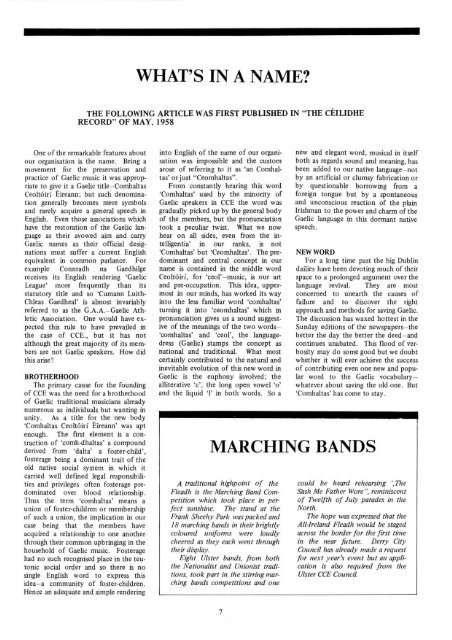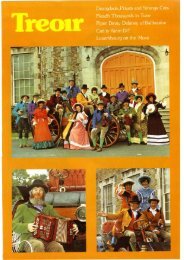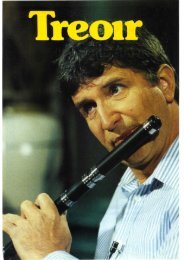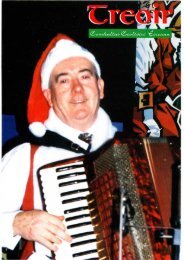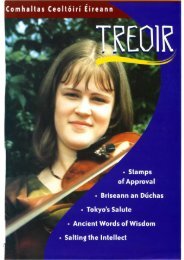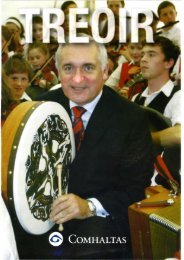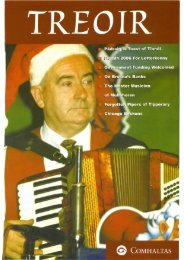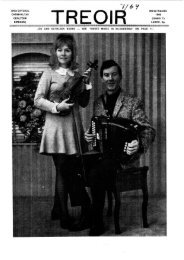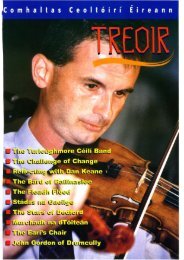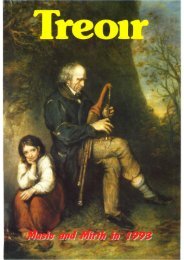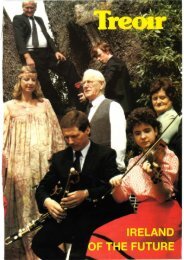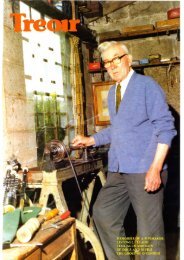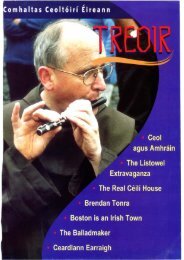ENNIS FLEADH NUA - Comhaltas Archive
ENNIS FLEADH NUA - Comhaltas Archive
ENNIS FLEADH NUA - Comhaltas Archive
- No tags were found...
Create successful ePaper yourself
Turn your PDF publications into a flip-book with our unique Google optimized e-Paper software.
WHAT'S IN A NAME?THE FOLLOWING ARTICLE WAS FIRST PUBLISHED IN "THE CEILlDHERECORD" OF MAY, 1958One of the remarkable features aboutour organisation is the name. Being amovement for the preservation andpractice of Gaelic music it was appropriateto give it a Gaelic title- <strong>Comhaltas</strong>Ceolt6irf Eireann ; but such denominationgenerally becomes mere symbolsand rarely acquire a general speech inEnglish. Even those associations whichhave the restoration of the Gaelic languageas their avowed aim and carryGaelic names as their official designationsmust suffer a current Englishequivalent in common parlance. Forexample Connradh na Gaedhilgereceives its English rendering 'GaelicLeague' more frequently than itsstatutory title and so 'Cumann LuithChleas Gaedheal' is almost invariablyreferred to as the G.A.A.-Gaelic AthleticAssociation. One would have expectedthis rule to have prevailed inthe case of CCE. , but it has notalthough the great majority of its membersare not Gaelic speakers. How didthis arise?BROTHERHOODThe primary cause for the foundingof CCE was the need for a brotherhoodof Gaelic traditional musicians alreadynumerous as individuals but wanting inunity. As a title for the new body'<strong>Comhaltas</strong> Ceolt6irf Eireann' was aptenough. The first element is a contractionof 'comh-dhaltas' a compoundderived from 'dalta' a foster-child ',fosterage being a dominant trait of theold native social system in which itcarried well defined legal responsibilitiesand privileges. often fosterage predominatedover blood relationship.Thus the term 'comhaltas' means aunion of foster-children or membershipof such a union, the implication in ourcase being that the members haveacquired a relationship to one another.through their common upbringing in thehousehold of Gaelic music. Fosteragehad no such recognised place in the teutonicsocial order and so there is nosingle English word to express thisidea- a community of foster-children.Hence an adequate and simple renderinginto English of the name of our organisationwas impossible and the customarose of referring to it as 'an <strong>Comhaltas</strong>'or just " Ceomhaltas" .From constantly hearing this word'<strong>Comhaltas</strong>' used by the minority ofGaelic speakers in CCE the word wasgradually picked up by the general bodyof the members, but the pronunciationtook a peculiar twist. What we nowhear on all sides, even from the intelligentia'in our ranks, is not'<strong>Comhaltas</strong>' but 'Ceomhaltas'. The predominantand central concept in ourname is contained in the middle wordCeolt6irf, for 'ceol'- music, is our artand pre-occupation. This idea, uppermostin our minds, has worked its wayinto the less familiar word 'comhaltas'turning it into 'ceomhaltas' which inpronunciation gives us a sound suggestiveof the meanings of the two words'comhaltas' and 'ceol', the languagedress(Gaelic) stamps the concept asnational and traditional. What mostcertainly contributed to the natural andinevitable evolution of this new word inGaelic is the euphony involved; thealliterative 'c', the long open vowel '0'and the liquid '1' in . both words. So anew and elegant word , musical in itselfboth as regards sound and meaning, hasbeen added to our native language- notby an artificial or clumsy fabrication orby questionable borrowing from aforeign tongue but by a spontaneousand unconscious reaction of the plainIrishman to the power and charm of theGaelic language in this dormant nativespeech.NEW WORDFor a long time past the big Dublindailies have been devoting much of theirspace to a prolonged argument over thelanguage revival. They are mostconcerned to unearth the causes offailure and to discover the rightapproach and methods for saving Gaelic.The discussion has waxed hottest in theSunday editions of the newspapers- thebetter the day the better the deed - andcontinues unabated. This flood of verbositymay do some good but we doubtwhether it will ever achieve the successof contributing even one new and popularword to the Gaelic vocabularywhateverabout saving the old one . But'<strong>Comhaltas</strong>' has come to stay.MARCHING BANDSA traditional highpoint of theFleadh is the Marching Band Competitionwhich took place in perfectsunshine. The stand at theFrank Sheehy Park was packed and18 marching bands in their brightlycoloured uniforms were loudlycheered as they each went throughtheir display.Eight Ulster bands, from boththe Nationalist and Unionist traditions,took part in the stirring marchingbands competitions and onecould be heard rehearsing ', TheSash Me Father Wore", reminiscentof Twelfth of July parades in theNorth.The hope was expressed that theAll-Ireland Fleadh would be stagedacross the border for the first timein the near fUture. Derry CityCouncil has already made a requestfor next y ear's event but an applicationis also required from theUlster CCE Council.7


